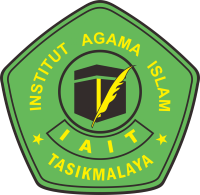Development of Islamic Education Teaching and Learning Methods Throughout History
DOI:
https://doi.org/10.61166/kasyafa.v2i3.17Keywords:
Teaching methods, Islamic education, educational innovation, history of education, digital learningAbstract
Teaching and learning methods in the context of Islamic education have experienced a significant transformation from the early times to the modern era. This article explores the evolution of these methods, from traditional approaches focused on memorization to modern methods that utilize digital technology. This research applies a historical approach to analyze changes and adjustments in teaching methods that have been made over time. Apart from that, this research also examines the various challenges faced by Islamic educators in trying to maintain a balance between traditional and modern values in the teaching process. In this study, it is shown how educators attempt to integrate modern aspects into Islamic education, without ignoring the basic principles that have existed for a long time. This diverse approach not only enriches the learning experience, but also creates space for students to understand and apply Islamic values in a broader context. With digital technology, for example, learning methods have become more interactive and interesting, allowing students to be actively involved in the educational process. The results of this research indicate that transformation in Islamic education teaching methods has the potential to improve the quality of the curriculum and effectiveness in the teaching and learning process. By utilizing the latest innovations, educators can overcome various challenges that arise, and provide a more relevant and meaningful educational experience for the younger generation. Therefore, it is important for educators to continue to adapt and develop teaching methods that suit the needs of the times, while still maintaining the core values of Islamic education.
References
Al-Attas, S. M. N. (1980). The concept of education in Islam: A framework for an Islamic philosophy of education. Kuala Lumpur: International Institute of Islamic Thought and Civilization.
Anati Rahila. (2024). Prospects of the Role of Parents in Islamic Religious Education in the Contemporary Era. Maklumat: Journal of Da’wah and Islamic Studies, 2(4), 211–223. https://doi.org/10.61166/maklumat.v2i4.28
Ateng Sanusi, & Iskandar Mirza. (2025). Islamic Education from a Tarbawy Perspective: Facing the Challenges of Globalization. Classroom: Journal of Islamic Education, 2(1), 107–112. https://doi.org/10.61166/classroom.v2i1.24
Bunaya, B., & Ilham Abdul Jalil. (2024). Character Transformation through Islamic Education: Literature Study of Al-Ghazali and Ibnu Miskawaih’s Thoughts. Elementaria: Journal of Educational Research, 2(1), 61–72. https://doi.org/10.61166/elm.v2i1.42
Eva Syarifatul Ma’rifati Siti Maldani. (2025). Basic Concept of Islamic Education from the Perspective of K.H. Hasyim Asy’ari. Al-Fadlan: Journal of Islamic Education and Teaching, 3(1), 50–62. https://doi.org/10.61166/fadlan.v3i1.80
Ibrahim, H. M. (2006). Islamic education: Its traditions and modernization into the Egyptian context. Cairo: The American University in Cairo Press.
Idris Afandi. (2025). The Influence Of Technology On Islamic Education In Indonesia . Responsive: Jurnal Manajemen Pendidikan Islam, 1(1), 34–38. https://doi.org/10.61166/responsive.v1i1.4
Maspuroh, Nurahda Febriyanti, Nova Diana Sauqia, & Vani Zakiyah. (2025). History of the Teaching Profession in Indonesia. Public Service: Jurnal Ilmu Sosial Dan Pendidikan, 2(1), 48–53. https://doi.org/10.61166/service.v2i1.12
Moch. Salman Alfarizi, & Khozin. (2024). Holistic Curriculum Development in Islamic Education Institutions in Vocational Schools. LECTURES: Journal of Islamic and Education Studies, 3(1), 19–26. https://doi.org/10.58355/lectures.v3i1.79
Muhtadi Abdul Mun’im, & Uswatun Hasanah. (2025). The Main Principles of Ibn Khaldun’s Thoughts in the Formation of Islamic Education. Al-Fadlan: Journal of Islamic Education and Teaching, 3(1), 63–75. https://doi.org/10.61166/fadlan.v3i1.81
Nasr, S. H. (2004). Islamic education: A critique and recommendations. In Islam and the secular mind (pp. 129-145). Oxford University Press.
Robitul Abror, & Muhtadi Abdul Mun’im. (2025). Flows and Paradigms of Classical Muslim Figures’ Thoughts on Education in Islam. Responsive: Jurnal Manajemen Pendidikan Islam, 1(1), 1–14. https://doi.org/10.61166/responsive.v1i1.1
Wardi, M. (2021). Education in Islam: A historical overview. Journal of Islamic Studies, 15(2), 87-102. https://scholar.google.com/citations?view_op=view_citation&hl=id&user=aWcyRZMAAAAJ&citation_for_view=aWcyRZMAAAAJ:hFOr9nPyWt4C
Downloads
Published
How to Cite
Issue
Section
License
Copyright (c) 2025 Abdillah, Muhtadi Abdul Mun’im

This work is licensed under a Creative Commons Attribution 4.0 International License.












